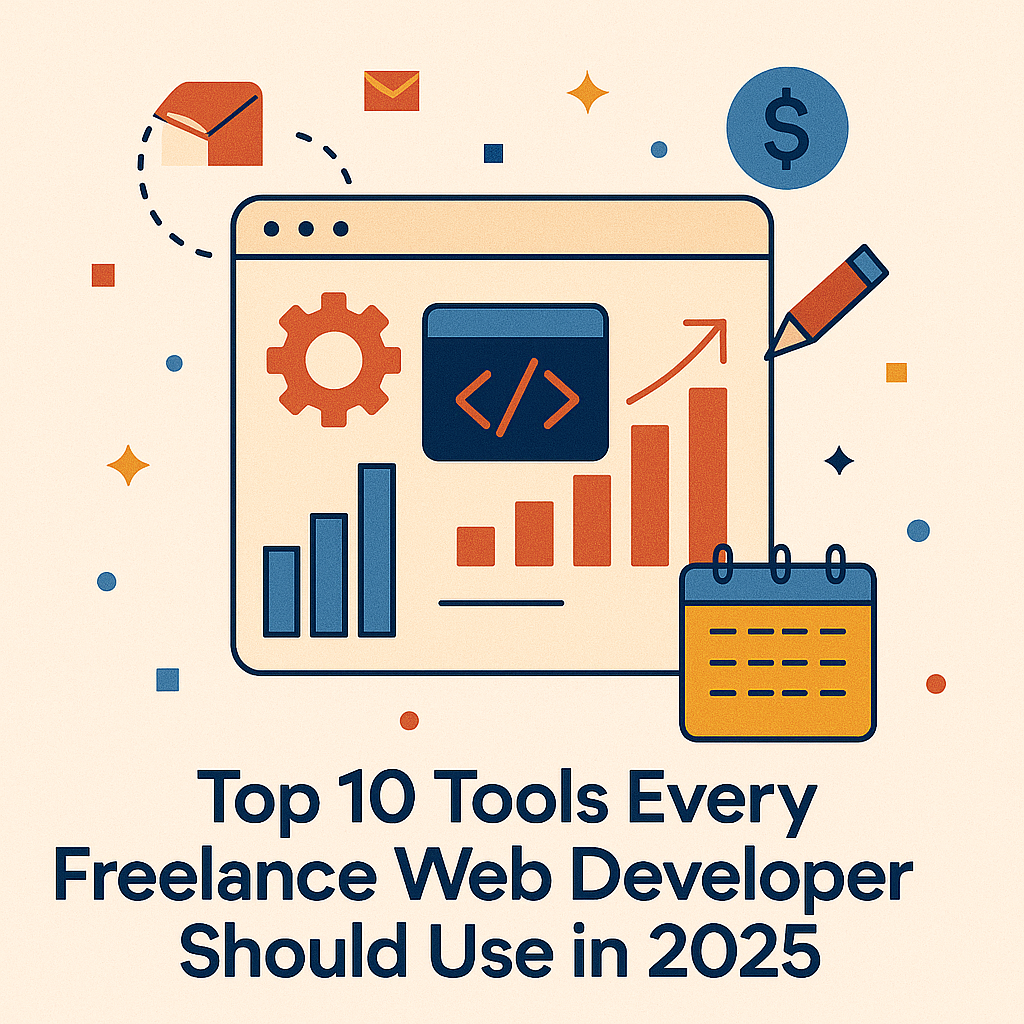
Top 10 Freelance Web Developer Tools to Use in 2025
The Actual Toolkit That Supports a Streamlined Workflow, Happy Customers, and Consistent Revenue
Introduction: A Tale Familiar to Freelancers Everywhere
Mia quit her agency work in 2022 to pursue her freelance ideal. She was eager, knowledgeable in HTML, CSS, and JS, and had a small suite of Upwork clients. But six months later, she was drowning not in work, but in tools, tabs, and to-do’s. She had a dozen applications doing duplicate work, was running after invoices, and dealing with late-night DMs from clients with unclear briefs.
Fast-forward to 2025, where Mia has a streamlined freelance business with stable income, streamlined workflows, and satisfied clients—all fueled by 10 tools that truly make a difference.
If you are just getting into it or are in “freelancer chaos mode,” then this guide will save you time, headache, and possibly your freelance sanity.
1. Notion – Your One-Stop Command Center
Use it for project planning, client portals, personal roadmap
Notion’s versatility allows you to manage your whole freelance business in one place. Mia utilizes it to keep track of her client projects, build collaborative workspaces, and even maintain invoice templates.
Why It Wins
- Easy to personalise
- Ideal for process documentation
- Free plan is sufficient to get started
Tip: Make a Notion “Client Hub” template—it’s a favorite among clients, and it makes you appear super-professional.
2. Trello or ClickUp – Project Visualization
Use it to track projects, to-do lists, and client feedback
Whether you like the boards of Trello or the one-stop power of ClickUp, a task manager is not optional in 2025. Eliminate missed Slack messages and “Where are we at?” emails.
Freelancer Needs It Solves:
✅ Clarity
✅ Accountability
✅ Alignment of workflow
3. Loom – Quick Video Guides to Your Clients
Use it on: Project alerts, customer feedback, how-to’s
Written feedback can easily be misinterpreted. Mia began sending 2-minute Loom videos to describe wireframes and dev decisions. The clients LOVED it.
Why It’s Better For Resale
- Streamlines your process
- Eliminates never-ending email threads
- Establishes trust and credibility
4. Bonsai – Contracts, Invoices & Client CRM
Use it for proposals, payment tracking, contracts, and payments.
If juggling emails, invoices, and contracts makes you loathe admin work, Bonsai consolidates them into one place. It automates 80% of client management.
Client-oriented Features
- E-signature ready
- Personalized payment links
- Late payment reminders
Referral Bonus: Bonsai provides a referral bonus if you refer it to another freelancer.
5. Figma – Design Collaboration for Devs
Use it for UI previews, design inspection, real-time edits
Not a designer? Figma’s still a friend of yours. Mia employs it to import wireframes and obtain dev specs directly from her client’s designer—and makes low-fidelity wireframes of her own.
Why You Should Care:
- Ideal for front-end oriented developers
- Speeds up feedback
- Free to use individually
⚙️ 6. CodeSandbox / StackBlitz – Lightning Fast Dev
Use it to conduct client demos, component previews, and bug testing
You don’t have to spin a whole dev environment to test out a feature. These tools allow you to share a working preview with clients instantly—without hosting.
✅ It is time-saving
✅ It looks pro
✅ It eliminates “it’s not working on my end” responses
7. Netlify or Vercel – Zero-Hass
Use it for: Website hosting, quick deployment, and CI/CD
FTP uploads are now a relic of the past. With a single Git push, you can now deploy a landing page, client site, or portfolio with custom domains, HTTPS, and serverless functions.
Why Developers Enjoy It
- Free plan is robust
- GitHub integrations
- Auto Previews of Pull Requests
8. Calendly – Set Boundaries Without Being Rude
Use it for booking calls, intro consultations, project check-ins
Sick of never-ending “What time does that work for you?” conversations? Calendly makes it easy to take charge.
Mia’s Strategy: She connects her Calendly to her email signature with just 2 slots available per week. It sets boundaries and a sense of urgency.
9. Ahrefs Webmaster Tools or Ubersuggest – Basic SEO For Devs
Use it for SEO audits, keyword discovery, and basic site health.
Clients do not simply want a pretty website—they want one that gets discovered. These free programs allow you to test broken links, SEO issues, and how keywords are performing.
Why You Would Want To Provide
- It enhances the value of your service
- Enough SEO know-how without the overwhelming
- Assists you in upselling current work
10. Google Workspace (or Zoho Mail) – Professional Email + Docs
Use it for business email, document sharing, contracts, and slides
Freelancers who have @gmail.com addresses in 2025 are just screaming “beginner.” A custom domain and a branded Gmail inbox make a big difference.
Why It Matters to Clients
- You appear solid
- You can structure docs, sheets, and drives
- Access controls for privacy
BONUS: Mia’s Favorite Productivity Toolkit
- Raycast: Spotlight search for developers
- Clockify: Time tracker to accurately bill clients
- Grammarly: Tidy up your proposals and onboarding documents
- Plausible Analytics: Privacy-oriented client website analysis
✅ Tools are just half the game
You can possess the greatest tools on earth, but if you don’t have boundaries, solid systems, and effective client communication—you’re going to burn out.
What was key to Mia’s success wasn’t the tools—it was her mindset shift: from independent developer to business owner.
